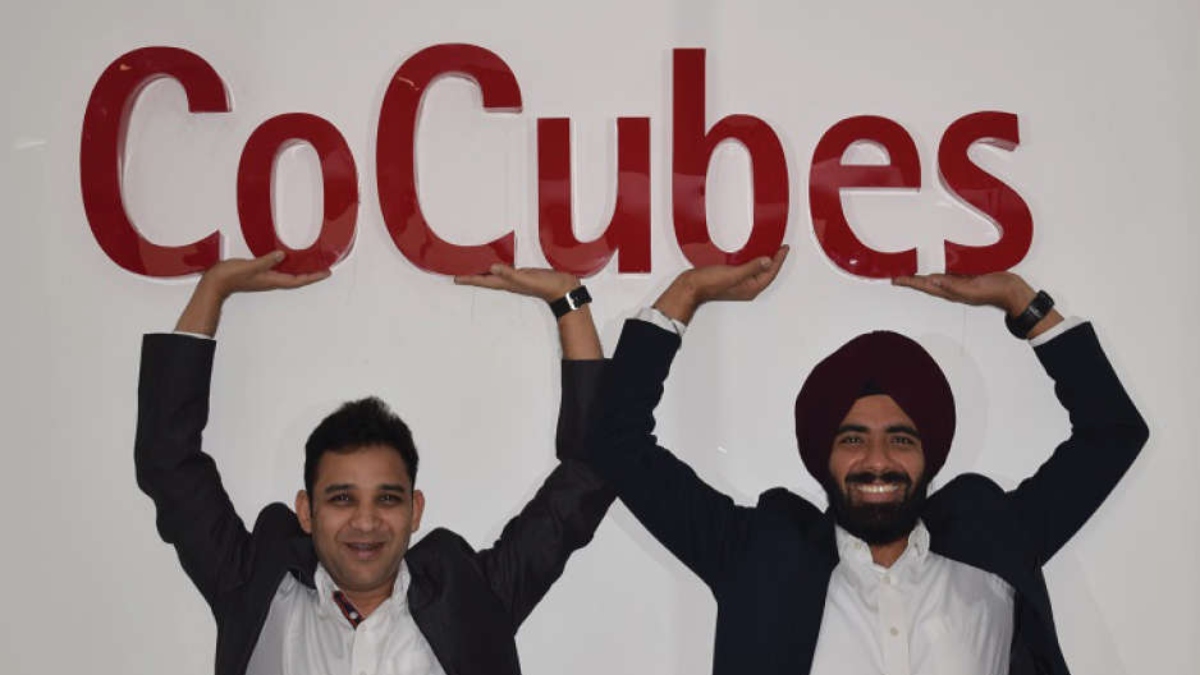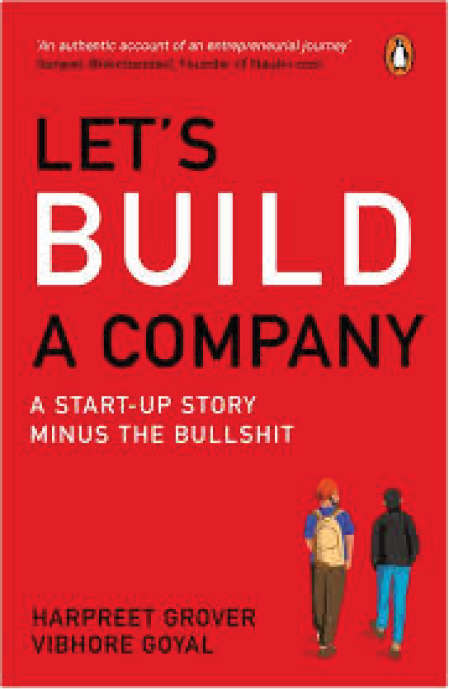


How many days a week do you work? We were asked this question by a lot of people interviewing for positions at CoCubes. Our answer: We work 24×7. We wanted there to be no ambiguity on what to expect once a person joined the company. We were open to the person growing fast, but we wanted folks who were willing to give every single day to CoCubes.
Pursuant to closing the investment round, we went into overdrive. We wanted to sign up more colleges and companies and hire a lot of people. One of the first things that happens after a funding round is a board meeting. In March 2009, we didn’t have the space to conduct the board meeting at our office. We still believed that we should save every penny and ended up having the meeting at our house. We projected the presentation on the wall and placed our dining-table chairs around it. Below the projected deck, the plaster on the wall was coming off due to seepage. At the end of the day, Raghu said, ‘I understand your need for frugality, but it will be best if we rent a place for a day to do our board meetings. Or you fly to Bangalore to do them at the Ojas office.’

At the end of the meeting, we set ourselves a target of signing on 100 companies and 1,000 colleges by December 2010, an eighteen-month time frame. But once we got on the ground, there were so many things to think through: What was the reason for large companies to buy from us? How did it differ for medium- and small-size firms? Should we build the product for both large and small companies? How to attract companies in different sectors? How to move beyond engineering colleges? How to target students directly?
This happens to the simplest of ideas. The number of threads one can pursue are endless, and it is the role of the founders to ensure that the company picks and sticks to the thread that leads to maximum value creation in the long term.
HIRING AFTER FUNDING
By now, one and a half years into running CoCubes, we had enough traction in colleges to try and hire a college sales head. Like most other entrepreneurs, my first hunch was to hire someone who was experienced enough, already knew the colleges and who had managed a team before. People of this description are generally found in large companies. I reached out to someone who was heading the campus team for a large BPO company. He had earlier been an entrepreneur too, and after running his family business for some time, had joined a large corporate. We convinced him to join us. We gave him a pay hike of more than 50 per cent. Also, his existing firm was paying for his executive MBA, so we agreed to pay his company back for the same. I remember fighting with Vibhore to justify this hire, saying: Look at the risk the person is taking with his career. And we need this person, he has college contacts.
I remember being excited at the prospect of someone from a brand joining our small company and saw it as a big victory. But my joy was short-lived. In a large company, there is a travel desk to book your tickets, a cafeteria for food, the hotels you stay in are nice. And most often the respect a third party (in our case, colleges) has is not for the individual but for the position the individual enjoys in a large company. Armed with the visiting card of a large company, one can procure a meeting easily. This doesn’t happen when you work with a startup. In a large company, because a lot is already set up and running, the work to do is mostly fine-tuning, as opposed to being in a startup, which needs you to build everything from scratch.
Also, we realised that the knowledge of understanding the college market was far less important than the skill it took to build and lead a team. We had hired someone who would be the fastest off the block, when, instead, we should have hired for the long term. Also, during the interview process, as a young CEO looking to hire someone senior for the first time, I had not asked the truly difficult questions about the role because I was afraid of putting the candidate off.
By the beginning of 2010, it was clear that the hired leader wasn’t the right one. I realised that I personally didn’t want to go and sell to colleges. The college market didn’t suit my strengths. And I hated that the selling in colleges wasn’t professional enough—it is possible that one would have to wait for a long time to meet the concerned parties, to get money in the bank might need multiple calls to the owner, and so on. Also, most colleges were located in tier-2 towns, which meant constant travel, making it difficult to manage other stuff at the company. So we decided to look for someone who could lead the entire college vertical; not only a sales head but a person who could evolve into a business head.
This time around, I decided to go with a reference. I asked around, but very few IITians wanted to be in sales. Most were doing analytics, consulting, operations and research—there was almost no one in sales. The only person I knew a little was Sameer Nagpal. He was from IIT Kanpur and was a friend of my former flatmate, Mrutyunjaya Panda. I had met him once when was visiting Panda. I called Panda to ask, ‘How is the guy? We need to hire for sales.’ Panda said Sameer loved to do sales and that once he thinks of getting something done, he does it. So I wrote to Sameer. At the time, Sameer was leading sales for a multinational company in Pune. I wasn’t thrilled to know that he was at a large company, but when I spoke to him, I realised that he also didn’t like being in one. He didn’t like that sales incentives were capped and processes did not encourage collaboration between teams.
We decided to meet and Sameer flew in to see us at our office at the Ansal Institute of Technology. We spent a full day together. He met Vibhore and our other teammates. It was a good meeting and I was feeling positive about taking the next steps. Then, as I was walking him out, I asked him where his parents lived. He said Delhi. I asked him if he was meeting them. He said no, as he hadn’t told them he would be in town, and joked about how sometimes he had coincidentally run into his surprised mother at the airport. I was a little taken aback by this and rethought our decision. I wanted to check if Sameer was someone who built and valued close relationships. As Sameer made his way to the airport, I called Panda. He assured me that Sameer was a family-oriented person, but I decided to spend more time pondering. I called Sameer to say that I would be in Pune and asked if I could stay at his place. He was open to it. I found out later that this had been his way of evaluating me. He wanted his wife to say yes to this too. We had a great evening together. His wife, Swetha, and I spent time pulling his leg, and well, Sameer ended up joining CoCubes as the head of sales and staying for ten short years.
In general, at CoCubes, we put in a lot of effort in our leadership hiring. When Nilay Kothari joined our technology team, he stayed at Vibhore’s house for the first two weeks. Similarly, for the first six months when Sameer was travelling back and forth from Pune (where his wife was working), he used to stay at my place. This helped us get the personal equation right, which set the right foundation for working together.
We were ten people before the funding, with our friend Sachin (who had joined before the failed angel funding round) being the only other senior leader apart from Vibhore and myself. By early 2010, we had expanded to thirty-four, with four senior leaders. The company had fanned out into different functions; corporate sales, college sales, operations and technology were the major pillars.
Most of the initial hires came from two sources: References or campus hiring. This was the time when the Indian economy was in a depression and, as a result, campus hiring had slowed down considerably. So as a startup offering reasonable starting salaries, we were able to get great-quality candidates.
Nobody tells a first-time entrepreneur how hiring is such a big part of running a company. Attracting the right people to work in your company is a full-time job. We made a lot of mistakes in hiring, but, over time, came up with these golden rules for hiring people for different levels:
• At the entry level, we hired people who had demonstrated doing any one thing well and had a positive attitude to learn. So someone could be a state player in cricket, a black belt in karate or an artist from the National School of Drama. This proved to us that the person, at some point in his or her life, had shown persistence to do one thing properly. The hope was that if the person has been able to do one thing well out of their own interest, then, if sufficiently excited, they would be able to do this job well too.
• For mid-level hiring, we realised that with a few years of experience, people learn the art of giving the right answers. They say what you want to hear, hence interviewing them is less useful. In such cases, the thing that we hinged our decisions on was a detailed reference check from their previous employers.
• In our leadership hires, we made a lot of mistakes, but we did eventually get it right. Apart from other learnings, we realised that it was important for the families to be on board. Because one ends up spending so much time on the startup, if the person’s family isn’t fully supportive and invested as well, it will become difficult for the role to work out. So we would meet their families and they would meet ours, or we would do a double date.
• We figured out that the right kind of people for an early-stage startup with less funding are people with at least one drawback. Generally, the drawback is either ‘weak spoken English’ or graduation from a ‘no-name college’. These are the people ignored by the big companies because they are biased towards certain colleges and types of hires. They want someone polished. That leaves a large pool of fresh graduates who can be employed and trained by start-ups. Many of these folks are naturally hungry to achieve. They want to succeed in life as much as you want to build your start-up.
Excerpts from the book, Let’s Build a Company (Penguin).